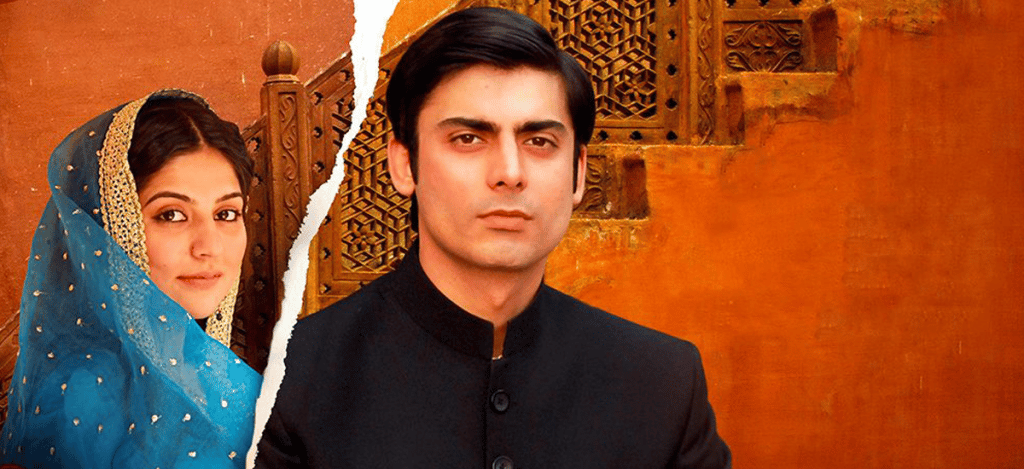
CAST: Fawad Khan, Ahsaan Khan, Saba Qamar, Sanam Baloch, Mehreen Raheel
DIRECTED BY: Haissam Hussain
Based on a novel called Bano by Razia Butt, Daastan is the story of the partition of the India subcontinent from a Pakistani perspective. Mainstream media has created many a narrative of the Indian perspective of this pernicious cataclysm in the history of the subcontinent that not only created 2 new countries but also changed lives of millions of people.
The balance between righteousness drafted by religionists and the need to create a place to feel safe culturally may have germinated the ideas for creation of a nation based on religious affiliation but documenting the realities of the cultural sentiment into individual motivations has been very craftily designed into the screenplay.
The story is deeply engaging, very poignantly portrayed and even when you lose patience with some of its slow paced scenes, you know that each expression, each movement of the body and each silence is building the story towards its crescendo.
Bano, Suraiya, Faheem and Salim and Hassan were childhood friends (and cousins) and all grew up together in Pre-partition Ludhiana in Indian Punjab. Hassan ( played by Fawad Khan in one of his very nuanced portrayals) is effected by the ideology of the All-India Muslim League, and becomes the leader of the Ludhiana Branch. He strongly believes in the establishment of Pakistan for Muslims and is an avid follower of Mohammad Ali Jinnah, the leader of the Muslim League and the movement for creation of Pakistan. Meanwhile, Saleem ( played by Ahsaan Khan ) is an active supporter of the Indian National Congress, with all his friends being Hindu. He strictly believes that the establishment of Pakistan will not help, but rather lessen the position of Muslims in India. The political debate between Saleem and Hassan begins as friendly competition, but intensifies as religious divisions become more intense throughout India.
Bano( the beautiful Saba Qamar) and Hassan fall in love and despite the differences in political ideologies between their families, they are betrothed to each other by their families.
Hassan leaves to join his newly found job in Rawalpindi with the intent of coming back in 4 months to marry Bano. The religious turmoil intensifies and Bano’s Hindu neighbors are unable to save them from rioters who kill her entire family in front of her eyes. In a state of trauma, her mother tries to choke her dead, to protect her from getting raped.
Based on a novel called Bano by Razia Butt, Daastan is the story of the partition of the India subcontinent from a Pakistani perspective. only created 2 new countries but also changed the lives of millions of people. ting the realities of the cultural sentiment into individual motivations has been very craftily designed into the screenplay.ongly believes in the establishment of Pakistan for Muslims and is an avid follower of Mohammad Ali Jinnah, the leader of the Muslim League, and the movement for the creation of Pakistan. Meanwhile, Saleem ( played by Ahsaan Khan ) is an active supporter of the Indian National Congress, with all his friends being Hindu. He strictly believes that the establishment of Pakistan will not help, but rather lessen the position of Muslims in India. The political debate between Saleem and Hassan begins as the friendly competition but intensifies as religious divisions become more intense throughout India.
In her mind, Pakistan becomes analogous to her safe place where she may never be harmed and she tries her best to make her way towards the newly drawn-out border in between the riots and the violence. On a train, Bano gets kidnapped by a rioting Sikh who marries her while keeping her in captivity and rapes her. She ends up having a baby, whom she abhors. Psychologically, Bano is broken and becomes unhinged, maniacal, and neurotic.
Meanwhile, years pass, and Hassan moves on in life with his cousin Rabia thinking that Bano and her family have not survived the partition.
The story is graphic in its depiction of her anguish and her efforts to somehow escape her tormentors to safety with her fiancée in Pakistan.
Hasan brings Bano home and wants to break off his engagement with Rabia to dedicate his life to Bano and her recovery. Bano overhears this and leaves Hasan’s house. She thinks she is safe in Pakistan, a country, the creation of which, had cost her a lot. Her family, her life, and her humanity. She starts working with a rich family thinking that this might be the Pakistan she had idolized in her mind, however , it shocks her to realize that the culture and moral ethics of the place which she called Pakistan was far different than the idealist brochure that she had been making in her fight for a safe country.
She ends up killing her rapist and is led to a life in a mental facility.
What hits the audience in the end is her cry for reason – Is this why lives of so many people were destroyed? The promise of a land where nothing could go wrong and no one could be less pious, for her, had been lost in the harsh reality of the land that was now called Pakistan.
The drama series is one of the best enactments of the trauma of refugees while they undergo the process of displacement. The story slow burns your soul and the performances of each of the main actors are not only flawless but also almost pristine towards the times they depict.
This is a classic to watch.




